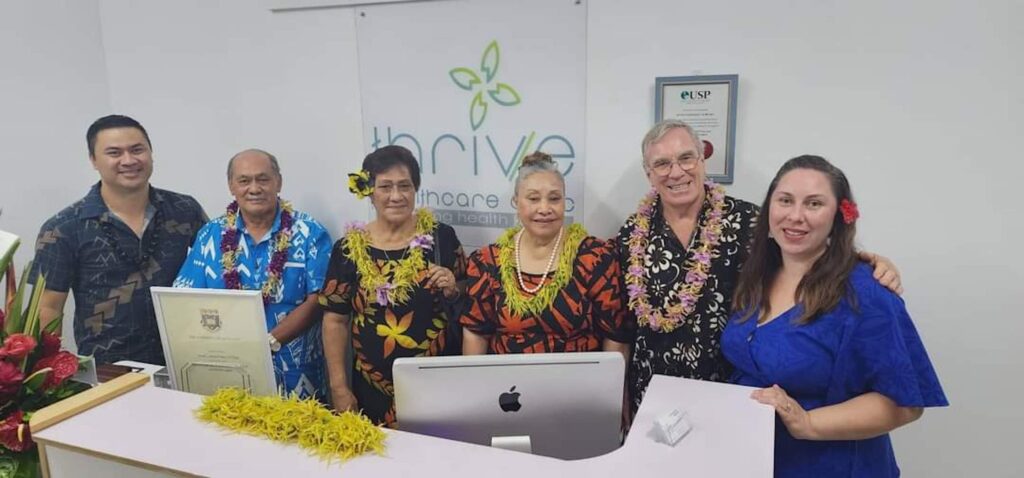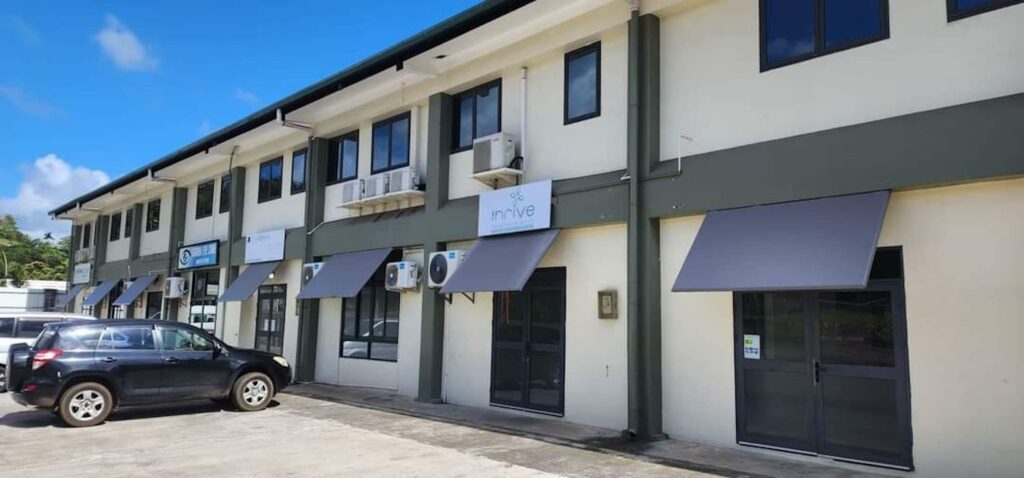By Nickel PR

Pic three: THRIVE clinic at Moto’otua
Pic four:
A new general practice opened to the public in Apia, Samoa in October, with a vision and focus on community wellness.
Dr. Su’a Sarah Brown-Ah Kau’s medical clinic – THRIVE – joins less than 12 female owned private health clinics in Apia, Samoa to offer targeted healthcare to the general community.
In her early thirties, married to Magele Daniel Ah Kau, and mother of three young boys, ages, four, three and just seven months old, Su’a has more than just a medical practice to run on her daily schedule.
Remarkably, Dr. Su’a seems to take it all in her stride with calm, ease, and serenity. She oozes altruism and service for others when she talks about her passion and her astounding resume reflects the walked talk.
Its easy to understand where she gets her passion and aspiration from -Dr. Su’a is the youngest daughter to her parents Fa’amausili Tuilimu Solo Tauiliili – Li’a Brown and Michael Brown. Afioga Fa’amausili Tuilimu is the first woman Vice President of the Lands and Titles Court of Samoa, and prior to that she was awarded the Queens’ Service Medal in 2001, for her services to the Aotearoa Pacific Communities via her social work services through her Trust – Lafitaga. Dr. Su’a says she finds inspiration from her mother and recalls that her calling in medicine came to her at the tender age of 10.
“My childhood is filled with memories of visiting the families my mother’s organisation served, to drop off food parcels and bags of bread that we’d collect from bakeries when they closed up. This upbringing instilled in me a heart to pursue a career in which I could help people,” she said.
It was a visit to an ill uncle who had been admitted in hospital, where she saw, he was struggling to breath and suffering a lot of pain, that she made a vow to him that she would become a doctor to help people like him with illness.
“God has since opened doors and opportunities for me to see that come to fruition,” she said humbly.
Dr. Su’a was educated for most of her young pre-tertiary years in Auckland, New Zealand.
A move for her mother’s Lafitaga Social Services organisation to Apia, Samoa prompted her to move with her mother midway through the year in 2002. There she attended Samoa College year 13, from April to December in 2002. In 2003 she completed University Preparatory Year at Le Papaigalagala University of Samoa, she humbly said she was able to make the cut for a New Zealand aid scholarship, but because of her residential status and education, she was ineligible for the scholarship.
However, as with everything, Dr. Su’a says she believes that God made a way for her and she was blessed with a Samoan government funded scholarship to the Fiji School of Medicine, Suva, Fiji. She graduated with a Bachelor of Medicine and Bachelor of Surgery MBBS in 2009.
In 2010 she started out her medical career with an internship at the Tupua Tamasese Meaole Hospital at Moto’otua with three monthly rotations through medical disciplines of Surgery, InternalMedicine, Paediatrics, Obstetrics & Gynaecology, Anaesthesia, Outpatient, Emergency and Community Medicine.
Despite all her extensive experiences working with senior doctors in the local profession across various disciplines of medicine, it is no surprise however that it was Public Health and Internal Medicine that caught her heart.
In 2012, whilst working in the Internal Medicine ward, known as Acute 8, Tupua Tamasese Meaole Hospital, Dr. Su’a was afforded the opportunity to work part-time hours -at the -Communicable Diseases Clinic, specifically overseeing clinical and public health prevention and control of Sexually Transmitted Infections, HIV, Tuberculosis and Leprosy.
“It was at that point, that I knew in my heart, that public health and serving communities through general practice was where my passion was,” said Dr. Su’a.

“With public and community health, you’re working towards seeing improved systems for better healthcare for the population as a whole, not just working with individuals.
In 2014, She managed to apply and was awarded a scholarship to complete her Master of Public Health, (First Class Honours) at the University of Auckland, New Zealand.
“You don’t see immediate change, and it may take decades before you see the returns in the work that you’ve done,” she said.
Clinic Services
“I have a lot of respect for all my colleagues in the private sector, I believe we all bring a wealth of knowledge and experience to our services,” she said.
“At Thrive Healthcare Clinic, we also bring a commitment to the life-course approach. We want to be partners with our clients to ensure their health through every stage of life – from conception through to end of life. We have many dreams and hopes for the services we can offer in the future. Watch this space, there’s more to come” she said.
At THRIVE Healthcare you can expect comprehensive primary healthcare services that includes:
● Disease prevention and screening
● Diagnosis and treatment of many types of illness
● Education related to disease prevention or treatment
● Injury care
● Counselling
● Coordination of care
THRIVE also offer these services in the following health areas:
● Family Medicine
● HIV Medicine
● Community Medicine
● Public Health
● Corporate Health
● Sexual & Reproductive Health
● Maternal & Newborn Health
● Child Health
● Youth Health
Dr. Su’a said her clinic – THRIVE – affords her the opportunity to work with her communities, individually, and still have room and ability to extend their services and work so that it is more accessible to the rural areas and grassroots levels at rural villages around the country.
It is clear – Dr. Su’a has more than just her clinic patients set in her sights, community wellness of the general population is what she thrives on, and she says she owes it all to God.
Based out of Moto’otua – Dr. Su’a took us through her new clinic.
It has polished tiled floors, tall white walls and high ceilings, chic tropically inspired furniture, two consultation rooms and a treatment room – with elei printed sheets, a kids’ corner with toys, a waiting area with cooled water.
Already, families based overseas have booked consultations, and requested home visit services for their families in Samoa. Dr. Su’a says home visits are becoming a very popular demand and she loves the challenge, as it comes with the bonus of her working outside of her office and connecting with her patients on a more personal level.
Personality
Dr. Su’a has the look of the usual serious, confident, guns blazing professional but as our interview continued, she was warm, gentle, funny, and infectiously humble.
Even after our interview, she was convinced that she was not the most ‘interesting’ topic to write about, but she hopes that she did well.
The irony is, she owns a Day Spa Salon as well – also called THRIVE, however, she has not given herself proper pampering in almost a year!
“With my work and trying to set up the clinic, the kids, family and everything else, I hadn’t realised I hadn’t given myself any proper time out,” she throws her hands in mid air with a shy modest smile.
She says that if and when she gets time, she would like to have a well-deserved wine with her girlfriends and female colleagues over a discussion on women’s health.
“That’s another passion of mine, I would really love the opportunity to work on a project that focuses on women’s health, particularly in the area of breastfeeding,” she said.
“Like most new mothers, I too struggled with breastfeeding, and it’s really an area that I would like to be able to do some more research on and find better ways to support new mothers and their newborn babies,” she said.
As a woman of faith, Dr. Su’a continuously references God, her parents, her husband and children and colleagues to the resilience, perseverance and drive that she has kept with to become who she is today in all her different roles and hats as a woman, daughter, mother, wife and least of all medical healer.
The Heavy Topics

Some of the questions we asked to pick Dr. Su’a’s professional locker:
What are some common health issues that you come across with our people and what solutions can you offer?
“By far, the group of health problems we encounter most and that have the greatest burden on our health system and economy in terms of cost and lost productivity are non-communicable diseases. How do we solve this? A one size fits all approach will not work. As a GP what can I do? I can provide education and promotion of healthy lifestyle choices; I can work with individuals and families to minimize their disease risks; and for those who already have an NCD, I can partner with them to control their disease and minimize its complications. But the work doesn’t end at the GPs clinic. In Samoa, we need to improve our health literacy and health seeking behaviours – we need to better engage our people, empowering and enabling them to take ownership of their health; we need decentralization of and improved access to healthcare services; we need to take a multi-sectoral approach to address the upstream determinants of health such as poverty, food security and unemployment to name a few. Fortunately, much of this work is already being done by the Ministry of Health and its health sector partners – the PEN Fa’aSamoa is one intervention that has great potential for impact on the prevention and control of NCDs as well as many other health problems and I look forward to seeing the returns of this intervention in the years and decades to come.
What changes would you like to see in Samoa’s Healthcare system?
I think we’re already beginning to see it in terms of service delivery – a renewed focus on and investment in primary healthcare and public health, decentralization of healthcare services, health programs reaching our communities at the grassroots. One particular area that has been in crisis for some time is the health workforce – the health sector is severely short staffed and in dire need of a solution. We have health professionals dealing with burnout, disgruntled service users, and unsatisfactory working conditions, having been there myself, it can be a really dark place – society sets very high expectations of health professionals, at times you begin to feel like a robot, and it can cause you to lose that very part of you that makes you a good clinician – your humanity/compassion/empathy. I would like to see a review of salaries for all health professionals – our salaries need to be on par with other countries in our region, a review of the working conditions and implementation of conditions that are actually applicable to the nature of the work that health professionals do i.e. we cannot apply the same working conditions set by PSC for public servants to public servants working in the health sector, the nature of the work of a health professional is completely different to that of someone working a 9am-5pm office job. I would like to see a plan implemented to address the chronic staff-shortage in the health sector – how do we recruit more qualified personnel and where do we recruit them from; how do we retain our existing workforce?